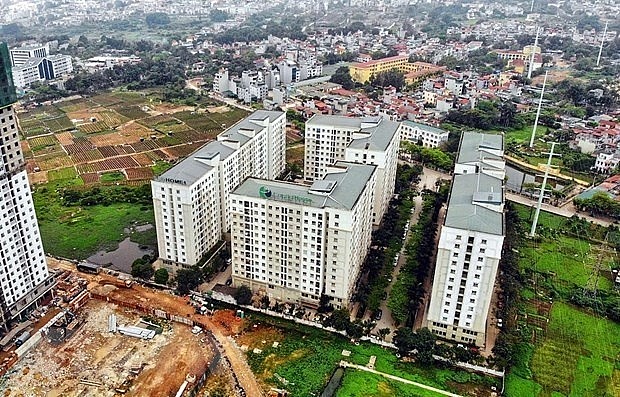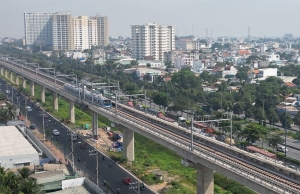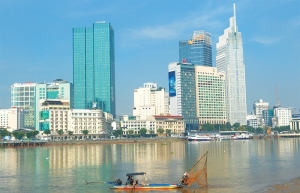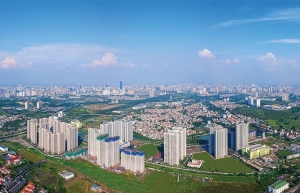Several consequences to be felt in real estate in 2023
At the event “2023: A Market Outlook” held by the British Chamber of Commerce in Vietnam on December 7 in Ho Chi Minh City, Savills Vietnam managing director Neil MacGregor acknowledged that it has been a tough time for domestic investors.
“Confidence of homebuyers is decreasing, obstacles in the legal framework remain, and credit squeezes are devastating the market. It can be said that this is not an ideal environment for businesses,” he said.
According to MacGregor, until the issues of the legal framework are improved, the market will witness a number of consequences such as construction processes being interrupted due to lack of capital, leading to business losses and sales dips. “This problem will last until investors can provide new products to the market, especially Grade B and C products,” he added.
The real estate market entered 2022 with big hopes of a strong recovery, with a high forecasted growth rate of 8 per cent. However, global economic fluctuations and various domestic factors in the second half of the year slowed down the market somewhat.
 |
| Several consequences to be felt in real estate in 2023, Illustrative image. (Photo: VNA) |
Chairman of the Vietnam Real Estate Association Nguyen Van Khoi said that pandemic problems and policy bottlenecks have been removed, but not thoroughly.
“Challenges from the enforcement side, competitive pressure from outside, new technology development trends and models, population ageing, environmental degradation, and climate change are also among the challenges for the real estate market,” Khoi said.
Pham Ngoc Thanh, chairman of the Board of Taseco Group, acknowledged at the seminar that the current real estate market still has many unresolved problems, and the law is still overlapping, so there is a need for stronger recommendations under the voice of the public associations.
“Associations need to promote communication to correct rumours in the real estate market in order to support businesses. They must organise more seminars raising debates on the status of the real estate market, and share opinions of developers and investors,” Thanh said.
Meanwhile, Tran Minh Hoang, deputy general secretary of the Vietnam Association of Realtors, assessed the difficulty of the market in 2023 will remain if interest rates have not been reduced. “Real estate prices will be far from reaching the high levels reported before the fever, especially in the context of many fluctuations. If investors hold up well, they can still overcome the difficult period,” Hoang said.
“But if their financial capacity is tight, they are forced to reduce the expected price to cut losses. Besides that, with fear that real estate prices will drop without stopping, investors can tell themselves to sell quickly to cut their losses.”
According to its report on residential real estate released on December 6, VNDIRECT said that the industry is facing many issues. Investors are having difficulty in restructuring debts due to tightening bank loans to real estate and strict supervision closely in the issuance of corporate bonds; rising interest rates are weakening housing demand; and new supply may decline as the legal approval process waits to be cleared up with the revised Law on Land.
“We estimate about VND46.1 trillion ($2 billion) of real estate corporate bonds will mature in the first half of 2023 and VND641 trillion ($2.79 billion) in the second half of 2023, causing liquidity pressure to repay loans to investors,” the report said. “We see that the financial capacity of listed real estate companies is now better than in 2011-2013 when the real estate crisis happened, so we expect the cycle to be shorter and less damaging.”
It expects the average primary unit price to decline by 5-10 per cent and the number of units to fall by about 20 per cent next year. “We expect the revised land law to be enacted by the second half of 2024, helping to remove legal bottlenecks in the approval of new housing projects, thereby helping the housing supply to recover from 2024-2025,” the report added.
The real estate sector continued to be an important part of the deal-making market in 2022. Many of them are from Vietnamese investors, but there are also significant transactions taking place between foreign parties.
Therefore, in the context of limited credit and lack of available capital in the domestic market, experts hope to see the interest of foreign investors as well as capital.
“We are seeing a lot of interest from international investors despite the difficulties of the global economy as a whole and in Vietnam in particular. We continue to receive continued interest from them across all market segments, and this trend will be maintained. That is also reflected in the results of foreign direct invest attraction in 2022,” MacGregor from Savills said.
 | Unpredictability stemming from housing market Even if the threat of recession seems to be on the wane in Vietnam, the real estate sector may encounter more battles in 2023, necessitating the elimination of legal and capital barriers, including real estate corporate bonds. |
 | Wheels in motion to resolve impediments in real estate After a period of sluggishness over the last couple of years, the real estate market has not yet rebounded as anticipated and has even shown symptoms of a standstill due to legal concerns. |
 | Liquidity risk topping realty concerns Vietnam will have to tackle a raft of liquidity issues facing realtors before the country’s stock market can rebound, an economic forum heard earlier this month. |
What the stars mean:
★ Poor ★ ★ Promising ★★★ Good ★★★★ Very good ★★★★★ Exceptional
Related Contents
Latest News
More News
- Fairmont opens first Vietnam property in Hanoi (February 04, 2026 | 16:09)
- Real estate investment trusts pivotal for long-term success (February 02, 2026 | 11:09)
- Dong Nai experiences shifting expectations and new industrial cycle (January 28, 2026 | 09:00)
- An Phat 5 Industrial Park targets ESG-driven investors in Hai Phong (January 26, 2026 | 08:30)
- Decree opens incentives for green urban development (January 24, 2026 | 11:18)
- Public investment is reshaping real estate’s role in Vietnam (January 21, 2026 | 10:04)
- Ho Chi Minh City seeks investor to revive Binh Quoi–Thanh Da project (January 19, 2026 | 11:58)
- Sun Group launches construction of Rach Chiec sports complex (January 16, 2026 | 16:17)
- CEO Group breaks ground on first industrial park in Haiphong Free Trade Zone (January 15, 2026 | 15:47)
- BRIGHTPARK Entertainment Complex opens in Ninh Binh (January 12, 2026 | 14:27)

 Tag:
Tag:




















 Mobile Version
Mobile Version